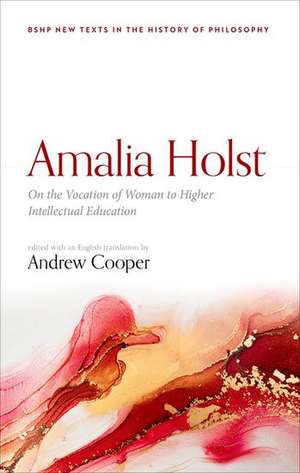Amalia Holst: On the Vocation of Woman to Higher Intellectual Education: British Society for the History of Philosophy:New Texts in the History of Philosophy
Editat de Andrew Cooperen Limba Engleză Hardback – 17 aug 2023
| Toate formatele și edițiile | Preț | Express |
|---|---|---|
| Paperback (1) | 129.55 lei 3-5 săpt. | +5.22 lei 6-10 zile |
| Cambridge University Press – 25 noi 2024 | 129.55 lei 3-5 săpt. | +5.22 lei 6-10 zile |
| Hardback (2) | 375.23 lei 10-16 zile | +83.07 lei 6-10 zile |
| OUP OXFORD – 17 aug 2023 | 375.23 lei 10-16 zile | +83.07 lei 6-10 zile |
| Cambridge University Press – 25 noi 2024 | 472.94 lei 6-8 săpt. |
Preț: 375.23 lei
Preț vechi: 518.25 lei
-28% Nou
Puncte Express: 563
Preț estimativ în valută:
71.80€ • 74.19$ • 59.73£
71.80€ • 74.19$ • 59.73£
Carte disponibilă
Livrare economică 15-21 februarie
Livrare express 11-15 februarie pentru 93.06 lei
Preluare comenzi: 021 569.72.76
Specificații
ISBN-13: 9780192845948
ISBN-10: 0192845942
Pagini: 224
Dimensiuni: 143 x 222 x 20 mm
Greutate: 0.41 kg
Editura: OUP OXFORD
Colecția OUP Oxford
Seria British Society for the History of Philosophy:New Texts in the History of Philosophy
Locul publicării:Oxford, United Kingdom
ISBN-10: 0192845942
Pagini: 224
Dimensiuni: 143 x 222 x 20 mm
Greutate: 0.41 kg
Editura: OUP OXFORD
Colecția OUP Oxford
Seria British Society for the History of Philosophy:New Texts in the History of Philosophy
Locul publicării:Oxford, United Kingdom
Recenzii
This excellent translation makes Amalia Holst's important and powerful book available to English-speaking readers for the first time, greatly advancing the recovery of German women philosophers. Andrew Cooper's superb introduction situates Holst in the context of German Enlightenment debates about the purpose of education and the vocation of woman, and carefully compares Holst's position to those of her male and female contemporaries. The book will be invaluable reading for all those seeking to recognise women's contributions to nineteenth-century philosophy.
Andrew Cooper's seamless translation of Amalia Holst's On the Vocation of Woman to Higher Intellectual Education is cause for celebration. In this work, Holst makes crucial contributions to the "vocation debates" of the eighteenth century, and offers insightful and penetrating critiques of her male contemporaries, who, in contrast to Holst, repeatedly argued that women were not fit for philosophical education. Her insightful and penetrating critiques reveal the extent to which these apparently enlightened thinkers were not able to fulfill the goals of the Enlightenment. And Holst seeks to do just that. This work is bound to transform the ways we teach and research this crucial moment in the history of philosophy, challenging us not only to expand the philosophical canon but also to rethink trusted philosophical premises and arguments.
Could there be a more relevant and much-needed book in eighteenth-century philosophy than Andrew Cooper's translation of Amalia Holst's On the Vocation of Woman to Higher Education (1802)? Holst argues for women's right to education and, in effect, takes to task the aspirations of a whole generation of Enlightenment thinkers. If the right to education is reserved for a segment of the population (male individuals), can we then say that the Enlightenment is committed to the uplift of the human being as such? Cooper's introduction to Holst's work is thorough, clear, and engaging; it provides a superb induction to Holst's important contribution and its relevance today. This text is a "must" for anyone interested in the philosophy of education, the critical potential of Enlightenment thought, and the politics of gender in recent history.
Andrew Cooper's seamless translation of Amalia Holst's On the Vocation of Woman to Higher Intellectual Education is cause for celebration. In this work, Holst makes crucial contributions to the "vocation debates" of the eighteenth century, and offers insightful and penetrating critiques of her male contemporaries, who, in contrast to Holst, repeatedly argued that women were not fit for philosophical education. Her insightful and penetrating critiques reveal the extent to which these apparently enlightened thinkers were not able to fulfill the goals of the Enlightenment. And Holst seeks to do just that. This work is bound to transform the ways we teach and research this crucial moment in the history of philosophy, challenging us not only to expand the philosophical canon but also to rethink trusted philosophical premises and arguments.
Could there be a more relevant and much-needed book in eighteenth-century philosophy than Andrew Cooper's translation of Amalia Holst's On the Vocation of Woman to Higher Education (1802)? Holst argues for women's right to education and, in effect, takes to task the aspirations of a whole generation of Enlightenment thinkers. If the right to education is reserved for a segment of the population (male individuals), can we then say that the Enlightenment is committed to the uplift of the human being as such? Cooper's introduction to Holst's work is thorough, clear, and engaging; it provides a superb induction to Holst's important contribution and its relevance today. This text is a "must" for anyone interested in the philosophy of education, the critical potential of Enlightenment thought, and the politics of gender in recent history.
Notă biografică
Andrew Cooper is Associate Professor of Philosophy at the University of Warwick. He is author of The Tragedy of Philosophy: Kant's Critique of Judgment and the Project of Aesthetics (2016) and Kant and the Transformation of Natural History (2023), and has published numerous articles on Kant, post-Kantian philosophy, and philosophy of science.







